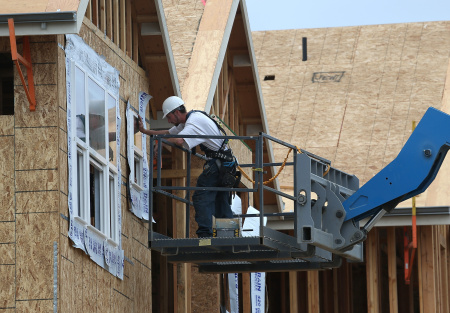
A construction worker installs a window in a new home at the Arbor Rose housing development in San Mateo, California.; Credit: Justin Sullivan/Getty Images
AirTalk®Senate Bill 35, introduced by Sen. Scott Weiner (D-San Francisco), aims to streamline the housing approval process by cutting red tape for certain projects.
This would include bypassing environmental and planning reviews, as well as mandating higher construction worker pay.
News broke from Capital Public Radio earlier this week, reporting that California Gov. Jerry Brown reached a deal with legislative Democrats on the bill. The agreement includes approval for projects meeting certain zoning standards and other requirements including paying construction workers a prevailing wage.
Proponents of the bill have seen it as a step in the right direction and a faster, more productive solution to dealing with the state’s housing crisis. But critics argue that the bill aims to be a “one size fits all” solution to a state that’s too diverse for this plan. Gentrification has also been a concern among opponents.
So what can Angelenos expect if SB 35 goes through? Larry Mantle speaks to advocates on both sides for the full picture.
Guests:
Fred Sutton, director of Government Affairs at the Apartment Association of Greater Los Angeles; they’ve publicly supported the bill
1. California is in the depth of a housing crisis. Every report that have come out say we are hundreds of thousands unit short of providing adequate housing for our population. SB 35 simply says if cities are not meeting their housing goals in as specified in their regional housing needs assessment, they will be eligible for streamlining, if the objective criteria is met.
2. The housing project must meet certain income levels where there's a shortage and meet all objecting in zoning, environmental codes. We've seen over and over again that housing projects that have been delayed or repealed during the approval process. And this is to stop exactly that.
3. It took us decades to get into this mess, lawmakers have not been taking the right approach in dealing with our housing crisis. There's no silver bullet to this but this bill is the best solution so far to increase housing.
Peter Cohen, co-director of the Council of Community Housing Organizations, a San Francisco-based coalition of affordable housing developers and tenant advocates.
1. The states does have an affordable housing crisis...If this was just about streamlining affordable housing across the state, I think you'd see a wide coalition of stakeholders and politicians getting behind this. But it's a bill mostly concentrated on streamlining market-priced, unaffordable housing.
2. The complication is that California is a massive state. We have over 400 cities. And a one-size fits all bill like this really treat communities on the ground the same. That could be as disruptive and negative as it could be beneficial in certain places.
3. The principle of supply and demand depends on geography. Building high density housing in a gentrifying neighborhood doesn't really make the outlining suburban cities less expensive. It depends on where you build it and how that elasticity works. This may accelerate development in the gentrifying neighborhood that's already hot.
This content is from Southern California Public Radio. View the original story at SCPR.org.



























